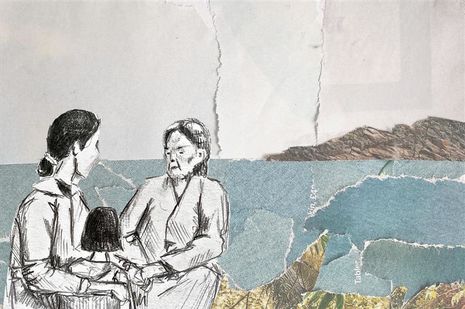Finding home in When Life Gives You Tangerines
Julia Ongking unpacks ambition, sacrifice, and what When Life Gives You Tangerines reveals about the ties that bind us to family

Growing up in Asia, my friends and I lived by Korean dramas, sharing our best recommendations, gossiping about the latest episodes of our favourite shows and spending sleepovers picking our next watch on the Asian streaming platform Viu.
Since coming to Cambridge, however, I’d forgotten about my love for Asian media. Consumed by navigating the cultural expectations of such a historically loaded city, I’d come to a sudden and jarring realisation sometime in late Lent term: I’d forgotten what it meant to be Asian.
“I’d forgotten what it meant to be Asian”
Back home for the summer and confined to my room by my ACL recovery, I was hearing the buzz around the recently released drama, When Life Gives You Tangerines (2025). Featuring IU (Lee Ji-eun) and Park Bo-Gum, avid K-drama fans were drawn to this star-studded (and devastatingly attractive) cast. While Korean dramas mainly enticed my younger self because of their unfailingly perfect male leads, heart-aching romantic tensions and beautiful backdrops, my post-first-year-at-Cambridge self now realises how I’d taken K-drama’s ability to honour deeper Asian values and culture for granted.
When Life Gives You Tangerines explores the plight of three generations of women, with this inter-generational chronology allowing the show to extend beyond its primary setting of then-rural Jeju Island in the 1960s to the nearby port-city of Busan, and, later, the South Korean capital of Seoul in the years surrounding the 1997 Asian Financial Crisis. Through shifts in geography and chronology, director Kim Won-suk emphasises themes of ambition, sacrifice and the traditional Asian value of filial piety. The closer the show moves to modernising Seoul, the more individual aspirations are realised, yet the further each daughter gets from her mother.
As an international Cambridge student, my relationship with ambition has been one caught up in similar complexity. Yes, it was ambition that got me into this university and exposed me to unparalleled opportunities: socially, academically, and professionally. But this ambition has often made me undervalue myself, ignoring my individual needs in the pursuit of external markers of success. It has separated me, by thousands of miles, from my family back home. I always wondered – do the tangible benefits of ambition outweigh what it was costing me personally? To my frustration, When Life Gives You Tangerines did not give me a clean answer, instead presenting me with the gritty realities of the regret of not having chased a dream and the guilt of having done so at the plight of others.
Through its depiction of pure sacrifice borne out of unconditional love from parent to child, and the subsequent guilt of ambition felt from child to parent upon seeing its plights, When Life Gives You Tangerines brought me back to a fundamental truth: we do not exist in a vacuum. It’s easy to forget that Cambridge’s environment naturally perpetuates individualistic values and worldviews by its geographic and colonial history – at times, wanting to assert my right to freedom and exploration, I find myself growing resentful of my obligations as a daughter and a sister and what I sometimes perceive to be too-frequent check-ups from my family back home.
“The show reinforces to me that relational burdens aren’t necessarily negative but can be borne out of unconditional love”
The show, however, reinforces to me that these relational burdens aren’t necessarily negative but can be borne out of unconditional love. Throughout the generations of sacrifice depicted across the series, I’m reminded of how new many modern states are, and, for many of us international students, how relatives as close as our grandparents or great-grandparents were responsible for working to get us where we are today.
Although the prioritisation of familial sacrifice within many Asian cultures undoubtedly passes down unresolved trauma, it also creates a sense of community that characterises tight-knit familial units. For many students who have grown up in non-Western contexts, moving away for university not only imposes physical barriers between themselves and their family, but also makes it easy to divorce oneself from the idea of the family as a deeply intertwined, mutually-dependent source of community. With ambition, however, becoming performative in many Asian cultures, where a child’s achievement is viewed as the necessary return on a family’s sacrifice, an individualised life abroad becomes tempting for many younger generations. Nevertheless, I argue that it is not so much the imposition of Western values but this gradual loss of community grounding that pushes many into hyper-individualist lifestyles and a Sisyphean search for external meaning.
“Ae-sun resists this fate, showing that meaning can be crafted even without visible, consumerist reward”
The sheer geographical and temporal ground the show covers depicts character growth in parallel with a Korea fresh from colonial conquest, both of which struggle with forming their distinct identities. Director Kim does a fantastic job using Ae-sun to challenge the growing fetishisation of instant and external gratification that threatens traditional Asian values on an individual and cultural scale. By frontloading loss into Ae-sun’s life – childhood loneliness, financial hardship, unfulfilled dreams – Director Kim evokes pity and fear within viewers, setting up an easy trap for them to read her life as irrevocably tragic. Yet Ae-sun resists this fate, showing that meaning can be crafted even without visible, consumerist reward.
Nearing the end of the show, Ae-sun, who has set aside her dreams of making a life for herself as a poet in the mainland, tells her daughter, Geum-myeong, “I’ve lived an extraordinary life in my own way. Don’t pity the life I’ve lived.” In turn, after years spent distancing from her family, guilt-ridden by their continued financial sacrifice for her success, Geum-myeong returns to her family home in Jeju, realising that it is not blind ambition but her family and the sacrifices they’ve made that show who has always been there for her without condition.
Across its generations, When Life Gives You Tangerines reminds me that ambition without community collapses into loneliness, that none of my life is truly mine alone. If I can call it extraordinary on my own terms, it is only because it is bound to the sacrifices that came before me — a return to a deeply Asian recognition that meaning is never solitary, but always shared.
 News / Report suggests Cambridge the hardest place to get a first in the country23 January 2026
News / Report suggests Cambridge the hardest place to get a first in the country23 January 2026 News / Reform candidate retracts claim of being Cambridge alum 26 January 2026
News / Reform candidate retracts claim of being Cambridge alum 26 January 2026 News / Cambridge ranks in the top ten for every subject area in 202623 January 2026
News / Cambridge ranks in the top ten for every subject area in 202623 January 2026 Comment / Cambridge has already become complacent on class23 January 2026
Comment / Cambridge has already become complacent on class23 January 2026 News / Palestine activists project slogans onto John’s24 January 2026
News / Palestine activists project slogans onto John’s24 January 2026









